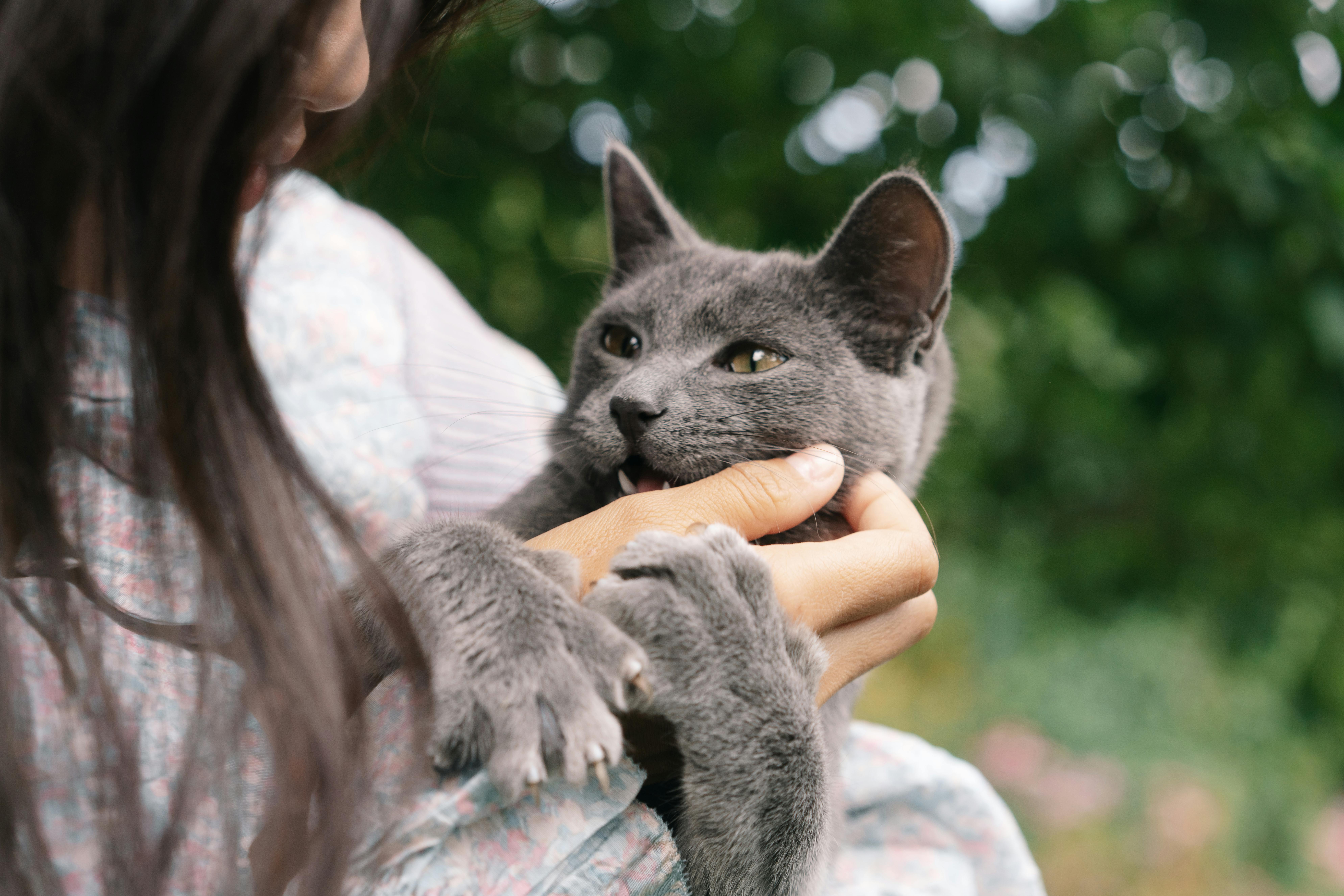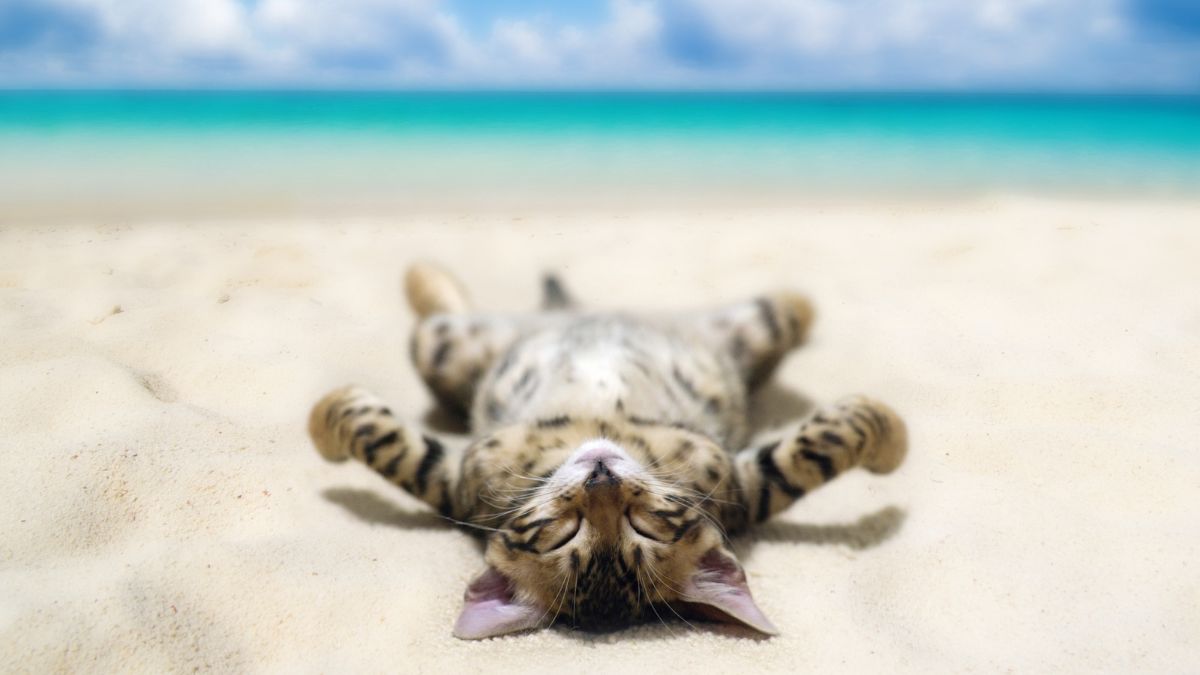As the owner of an affectionate, dedicated cat, you may have already asked yourself, “Why does my cat bite me?”. This often adorable, but sometimes painful behavior can perplex even the most experienced cat owners. This article aims to demystify the reasons why cats chew and to give valuable advice on how to respond appropriately to this behavior.
- Understanding feline language
- Deciphering biting in cats: a form of communication
- Why does my cat bite me: The main reasons
- How should I react to a cat biting? Expert advice
- Prevent biting in cats: proven techniques and tips
- Teach the cat limits to play
- Use toys to discourage biting
- Enrich your cat’s environment to avoid boredom
- Nibbling in cats: understanding for better interaction
Understanding feline language
Cats are undoubtedly mysterious and fascinating creatures with a rich language of communication that combines body language, vocalizations and even nipping. To decipher the mystery of “feline bites”, we first need to understand that this is simply another way for cats to communicate. Cats aren’t always known for the casualness some of them display compared to other pets, and their penchant for independence can leave some owners at a loss as to how to behave. However, every meow, scratch, tail wag and bite has a meaning in your cat’s world.
Deciphering biting in cats: a form of communication
You may be surprised to learn that in many cases, cats don’t bite out of aggression, but as a form of communication. Yes, you read that right – your cat is “talking” with its teeth! Understanding this fundamental truth can help you decipher why your cat bites you.
The link between cats and biting
Cats, especially kittens, are often engaged in forms of play that involve friendly biting. They are known to nibble gently when playing, whether with each other or with you. They can also use chewing to explore their environment, just as a baby explores the world by putting everything it can grab into its mouth. Biting can also be a way for them to show you affection. After all, how would you express your love if you had no hands to caress or embrace?
Learning to bite in kittens
In kittens, biting is generally an important part of their social learning. They learn to understand limits and develop their coordination. It’s an important stage in their growth and development, and is usually something they learn from their mother and siblings. Unfortunately, kittens who are weaned too early or who don’t have the opportunity to play with other kittens may not learn to moderate their biting, which can lead to more insistent or harder biting when these kittens become adults.
Why does my cat bite me: The main reasons
There are many reasons why a cat might decide to give you a small (or sometimes not so small) bite. Identifying the reason why your cat bites is regularly the first step to modifying this behavior, if necessary.
The cat bites for fun
As mentioned above, biting is often a form of play for cats. Your cat may simply be in a playful mood, nipping at your fingers or feet to entice you to play with him. This is particularly common in kittens, but some adult cats retain this playful behavior. If this is the case, you’ll probably notice that the nipping is usually gentle and accompanied by other signs of playfulness, such as an animated tail wag or a lively gaze.
The cat bites to attract attention
Does your cat nip at you when you’re too engrossed in your computer or phone to cuddle him? This could be his way of telling you that he wants a little more attention. Just as a child pulls on his mother’s sleeve to get her attention, your cat can use nipping as a tool to draw your attention to him. It’s a particularly effective way of attracting attention, because it’s hard to ignore!
Cats chew to express boredom or stress
Cats are intelligent, curious creatures who need a certain level of stimulation. When they’re bored or their environment changes, they may express their stress or boredom by developing destructive or harmful behaviors, such as excessive chewing.
It’s important to keep your cat’s environment stimulating. Offer him a variety of interactive toys and make sure he has access to things to climb, places to explore and perspectives on the outside world. A window overlooking a garden full of birds can be a non-stop TV show for your cat.
How should I react to a cat biting? Expert advice
How you react when your cat bites can make a big difference to your cat’s future behavior. It’s crucial that you react appropriately to encourage positive behavior and avoid the escalation of biting.
Appropriate response to biting
If your cat bites you, the first thing to do is stay calm. Do not withdraw your hand abruptly, as this may frighten your cat and provoke a more aggressive reaction. The best way is to divert his attention with a toy or other distraction.
You may instinctively think of scolding your cat when nipping becomes aggressive or painful. However, it’s important to remember that cats don’t understand punishment in the same way as dogs or humans. Because of their independent nature, they will most likely associate the punishment with you rather than their bad behavior. As a result, they may develop a fear or mistrust of you, which can exacerbate the problem.
Avoid behaviour that encourages biting
Never forget that you are your cat’s role model. That’s why it’s important not to encourage chewing by using your hands or fingers as toys. This is a common mistake made by many cat owners, especially when playing with kittens.
While it may seem cute when your kitten is small, allowing her to nibble your hands can set a dangerous precedent. Kittens may grow up thinking it’s okay to bite humans, an idea that’s much less cute when your 6 kg cat with full fangs decides to give a “play” bite.
Prevent biting in cats: proven techniques and tips
The best way to manage biting in cats is to try to prevent it before it happens. Fortunately, there are many tried-and-tested techniques for doing just that.
Teach the cat limits to play
One way to prevent biting is to teach your cat the limits of play from an early age. This means establishing clear rules about what is and isn’t acceptable during gaming sessions.
Use toys to discourage biting
Another effective tactic to discourage chewing is to provide your cat with a variety of chew toys. It’s a great way to give them a proper outlet for their natural need to chew.
Enrich your cat’s environment to avoid boredom
An enriched environment is essential to keep your cat busy and reduce the boredom that can lead to chewing behavior. Try incorporating scratching posts, interactive toys, cat towers and other elements your cat can explore.
Nibbling in cats: understanding for better interaction
In short, biting in cats is often a form of communication, not a sign of aggression. By decoding your cat’s body language and responding appropriately, you can create a more positive dynamic, reduce stress for both you and your four-legged friend, and strengthen the bond between you.
Remember, if your cat’s nipping becomes a problem, or if you feel overwhelmed by his behavior, it’s always advisable to consult a pet behavior professional. They have the expertise to help you navigate this situation and develop a solution that works for you and your cat.





